
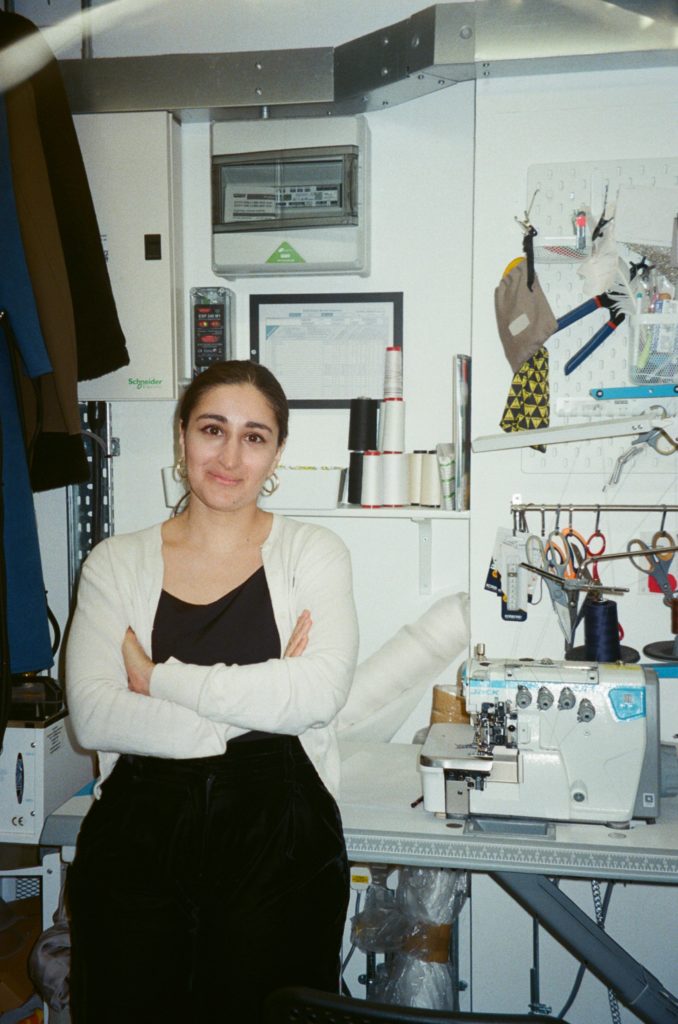
Asya Ter-Hovakimyan
Image: Loana Rondot
Omniss
Image: Loana Rondot
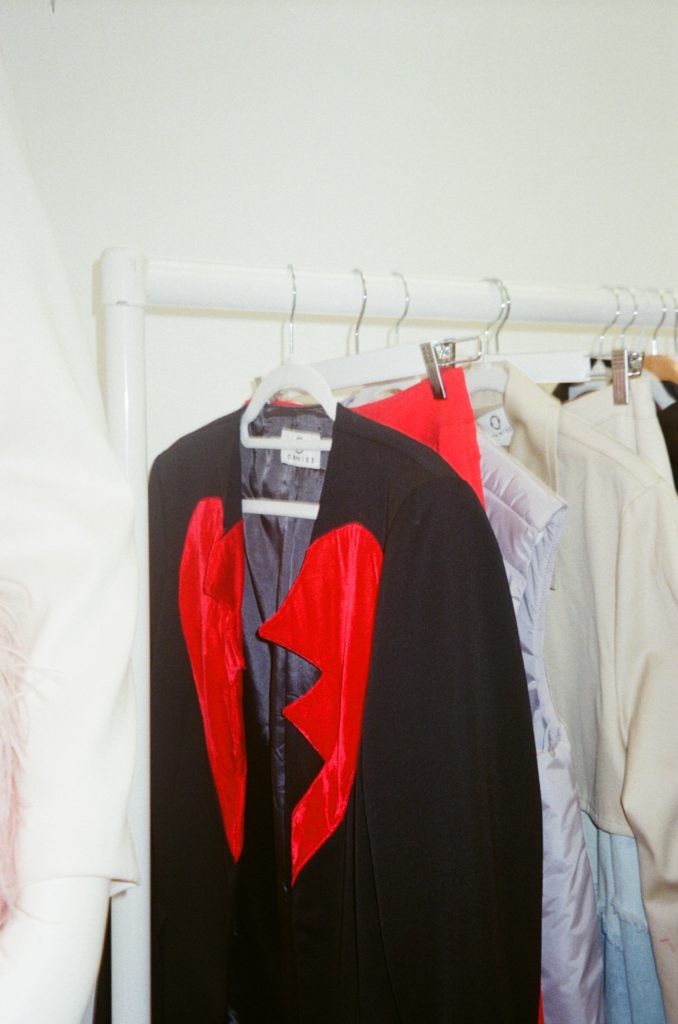
In a calm corner of Hackney Wick, surrounded by worktables, fabrics and half-finished garments, Asya Ter-Hovakimyan is quietly reviving a tradition the fashion world is at risk of losing. As the founder of Omniss and Omnifix, her work bridges contemporary design and the dying craft of garment repair, offering a new vision for the future of fashion.
Asya’s journey began not with catwalks or magazines but through a deep love of making. Growing up in an Armenian family, she learned traditional embroidery techniques from the age of five and began upcycling clothes long before it became mainstream. “It was very organic,” she says. “And rooted in craft.” After studying at London College of Fashion, she and her co-founder Francisco Zhou launched Omniss, initially following the traditional path of wholesale and runway shows.
A shift toward direct-to-consumer pop-ups changed everything. “It’s much easier to convince the customer who loves your product than the industry, which is still full of biases,” she says. It taught them that personal connection, not industry validation, was the real driver of their brand.
Omnifix, the repair arm of the business, grew almost by accident during the pandemic when clients began asking for help with sentimental pieces. “The skill of making clothes properly is disappearing in the UK,” Asya says. “Dry cleaners can handle small fixes, but real construction knowledge is rare.” Her team approaches repairs like makers, not tailors, understanding how a garment was built and restoring it with care.

“Our studio is unique because a seamstress who once made designer dresses might work alongside a recent fashion graduate who hasn’t been properly taught how garments are constructed,” she says. “They exchange knowledge. I think this is one of the ways we begin to solve the problems fashion faces, by encouraging collaboration at the making stage.” Through Omnifix, she hopes to reconnect people with the often overlooked craftsmanship behind what they wear.
Her experience joining the first cohort of Evo Fashion, Fashion District’s programme for emerging brands, helped sharpen that mission. “It was like therapy for the brand,”” she says. “It gave me perspective, helped refine our storytelling and encouraged me to trust our approach.”
At this year’s Fashion District Festival, Omnifix will run a Repair Clinic, inviting the public to bring garments for mending and learn the skills to care for their wardrobes. “Once people understand the effort behind a repair, they start valuing their clothes differently,” she says.
Looking ahead, Omniss is preparing to launch a new capsule knitwear collection this autumn, building on one of its best-selling product lines. Omnifix is also expanding its reach, including a partnership with East London brand Percival to offer specialist tailoring services.
At a time when much of fashion is speeding toward ever faster cycles of production and consumption, Asya Ter-Hovakimyan is offering something more enduring. Her work is a reminder that fashion, at its best, is not just about what is seen on the surface, but about what is carefully built, and carefully preserved, behind the seams.
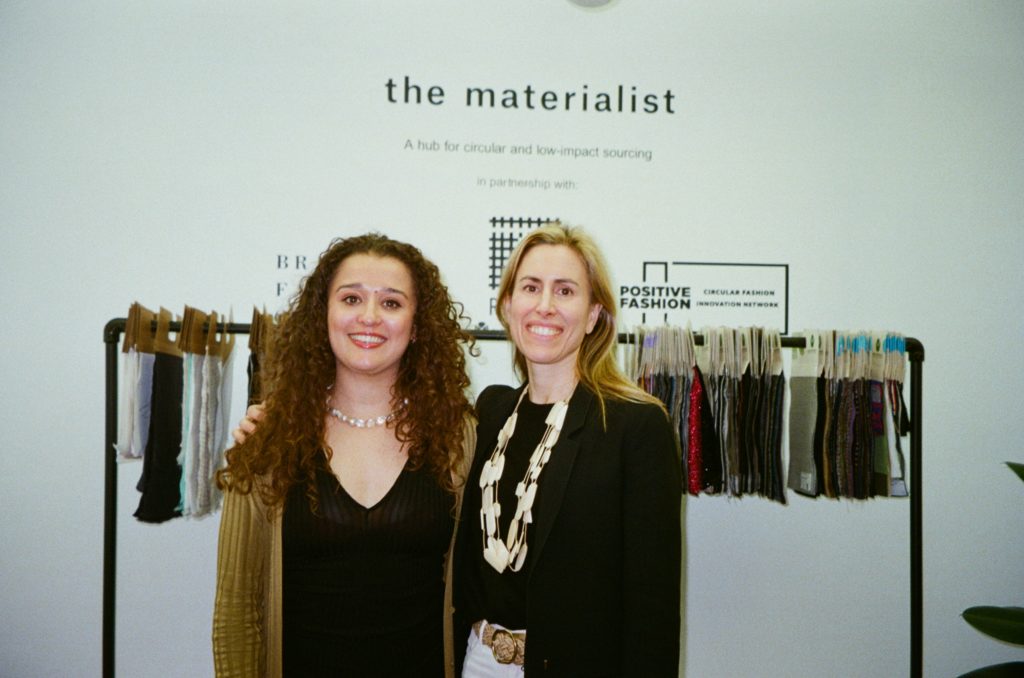
Liv and Lavinia
Image: Loana Rondot
Fabrics in the Showroom
Image: Loana Rondot
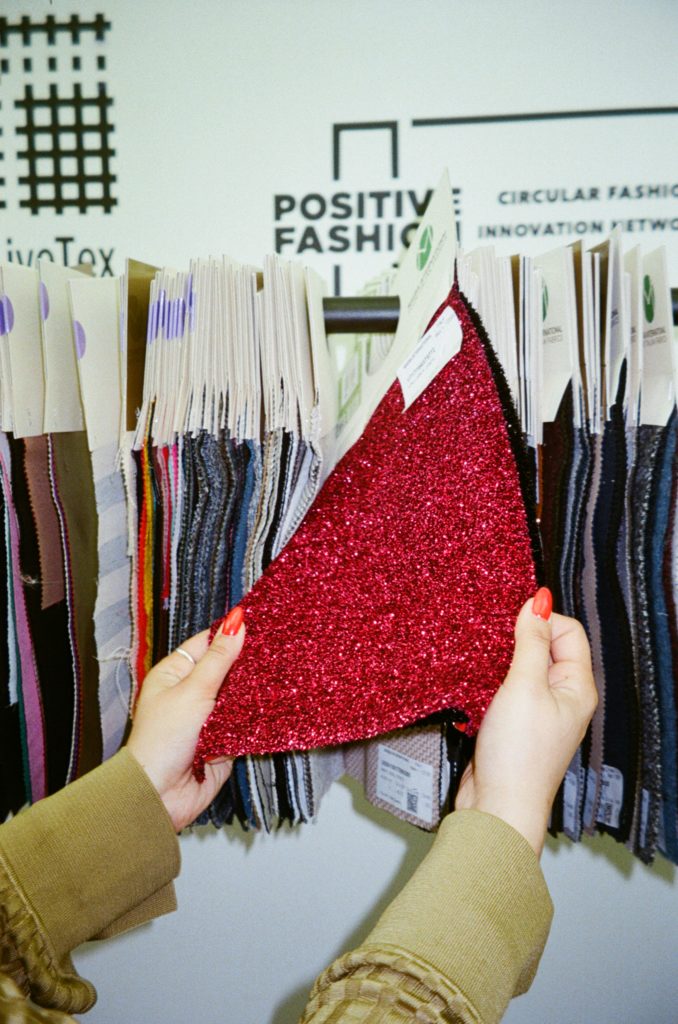
At The Materialist’s Regent Street showroom, the energy is palpable. Fabric samples hang on rails around the room, the team moves between meetings and a few remaining croissants and fruit hint at the industry breakfast they hosted earlier that morning. It is a space that feels alive with ideas, a fitting home for a business founded on the principle that fashion’s future lies in rethinking the materials already at hand.
Liv Khan, who co-founded The Materialist during the upheaval of the pandemic, did not come to fashion through the traditional route. “I studied history and economics,” she says, “but I always loved the world of fashion and knew I wanted to start my own business.” After running a warehousing operation for fashion brands, she encountered a persistent problem: excess fabric rolls piling up with nowhere to go. “Brands didn’t know what to do with it. Some asked if we could throw it away. That’s when I realised the scale of the waste and the opportunity.”
Her co-founder, Lavinia Santovetti, also arrived in fashion from a different world. After more than a decade working in finance, she had launched an accessories brand just before the pandemic. A visit to a manufacturer’s factory in Italy became a turning point. “I saw piles of gorgeous leather left behind by big brands,” Lavinia says. “It was a wake-up call.” Introduced through a mutual connection, Liv and Lavinia quickly discovered they shared a vision for a more resourceful, sustainable approach to fashion.
Together, they built The Materialist to offer an alternative. By connecting brands with surplus fabrics to new buyers, the company created a new ecosystem where excess materials could find new life rather than going to landfill. “At the beginning, deadstock was a dirty secret,” Liv says. “No one wanted to talk about it. Brands and mills denied having any. But we worked with what we had: setting up donation programmes, starting conversations, knocking on a lot of doors.”
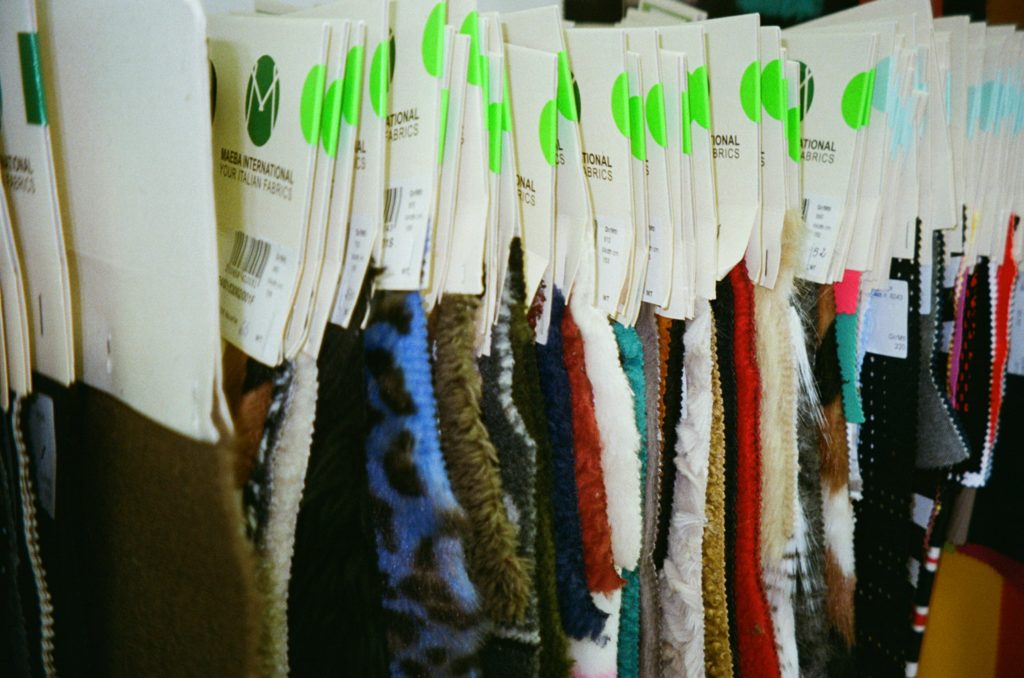
Persistence paid off. Today, The Materialist works with a growing network of designers and manufacturers and attitudes towards deadstock have shifted. “Now it’s almost cool,” Liv says. “People are proud to use excess materials. But we are careful. It can’t just be a trend. It has to become a fundamental part of how the industry operates.”
Opening a physical showroom helped solidify their mission. “It changed everything,” Liv says. “People can come here, see the quality for themselves and understand that deadstock isn’t old, damaged or outdated. It’s beautiful, high-quality fabric, and it deserves to be used.” Success stories include everything from emerging brands sourcing materials to Vivienne Westwood featuring Materialist-sourced fabric on the runway at Paris Fashion Week this February.
Both founders are clear about the challenges of running a purpose-driven business. “You can’t do everything perfectly,” Liv says. “But you can be honest. That transparency is what builds trust. The old culture of secrecy in fashion is changing, and businesses have to be open about their challenges as well as their successes.”
This year, The Materialist is partnering with the Fashion District Festival as our official Fabrics Partner, generously donating fabrics to be used in workshops across the festival programme. “Fashion District embodies everything we believe in,” Liv says. “It’s about sharing ideas, building networks and supporting sustainable change.”
Looking ahead, The Materialist is preparing for a major move to a larger space, where they hope to expand access and welcome walk-ins. “We want to work with everyone,” Liv says. “Big brands, small brands – anyone who wants to do things better.”

For the latest updates from Omniss and Omnifix, visit omnissworld.com and omni-fix.com. To learn more about materialist, head to thematerialist.co and @thematerialist.co.
Fashion District Festival runs from 3-8th June 2025. Tickets are now live – explore the programme and book your tickets, subscribe to our newsletter for the latest updates, and follow us to keep up-to-date with our latest events and opportunities: